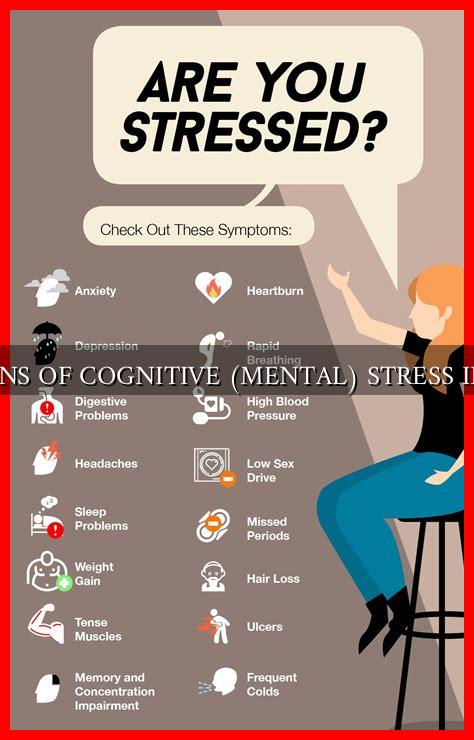-
Table of Contents
The Signs of Cognitive (Mental) Stress Include
In today’s fast-paced world, it’s not uncommon to experience cognitive stress due to various factors such as work pressure, personal relationships, financial worries, and health concerns. Cognitive stress can have a significant impact on our mental well-being and overall quality of life. Recognizing the signs of cognitive stress is crucial in order to address and manage it effectively. In this article, we will explore the signs of cognitive stress and provide insights on how to cope with it.
1. Difficulty Concentrating
One of the most common signs of cognitive stress is difficulty concentrating. When you are under stress, your mind may wander, making it challenging to focus on tasks at hand. This can lead to decreased productivity and performance at work or school.
- Examples: Making frequent mistakes, forgetting important details, feeling overwhelmed by simple tasks.
2. Memory Problems
Cognitive stress can also affect your memory. You may find it hard to remember things, such as appointments, deadlines, or even simple everyday tasks. This can be frustrating and add to your stress levels.
- Examples: Forgetting where you placed your keys, blanking out during conversations, struggling to recall recent events.
3. Irritability and Mood Swings
Stress can impact your emotions, leading to irritability, mood swings, and even outbursts of anger. You may find yourself snapping at loved ones or colleagues over minor issues, which can strain relationships.
- Examples: Feeling easily frustrated, getting upset over small inconveniences, experiencing sudden shifts in mood.
4. Sleep Disturbances
Cognitive stress can disrupt your sleep patterns, leading to insomnia or restless nights. Lack of quality sleep can further exacerbate stress levels, creating a vicious cycle that is hard to break.
- Examples: Difficulty falling asleep, waking up frequently during the night, feeling tired and groggy in the morning.
5. Physical Symptoms
Stress doesn’t just affect your mind; it can also manifest in physical symptoms such as headaches, muscle tension, stomach issues, and fatigue. These physical signs should not be ignored, as they can be indicative of underlying cognitive stress.
- Examples: Persistent headaches, tightness in the neck and shoulders, digestive problems, low energy levels.
6. Changes in Appetite
Some people may experience changes in appetite when under cognitive stress. You may find yourself overeating or undereating as a way to cope with your emotions. These changes can impact your overall health and well-being.
- Examples: Stress eating, loss of appetite, cravings for unhealthy foods, binge eating.
7. Social Withdrawal
When you are stressed, you may feel the urge to withdraw from social interactions and isolate yourself from others. This can lead to feelings of loneliness and further exacerbate your stress levels.
- Examples: Avoiding social gatherings, canceling plans with friends, preferring to be alone most of the time.
8. Racing Thoughts
Cognitive stress can cause your mind to race with negative thoughts and worries, making it hard to relax and unwind. This constant mental chatter can be exhausting and overwhelming.
- Examples: Obsessing over past mistakes, worrying about the future, feeling anxious for no apparent reason.
9. Inability to Relax
Lastly, cognitive stress can make it difficult for you to relax and unwind. You may find it hard to switch off your mind and find moments of peace and calm amidst the chaos.
- Examples: Feeling restless during downtime, being unable to enjoy leisure activities, constantly feeling on edge.
Summary
Recognizing the signs of cognitive stress is the first step towards managing and overcoming it. By being aware of these signs, you can take proactive steps to reduce stress levels and improve your mental well-being. It’s important to practice self-care, seek support from loved ones or a mental health professional, and engage in stress-relieving activities such as exercise, meditation, and mindfulness. Remember, it’s okay to ask for help when you need it, and taking care of your mental health is just as important as taking care of your physical health.
For more information on coping with cognitive stress, you can visit American Psychological Association – Stress.


